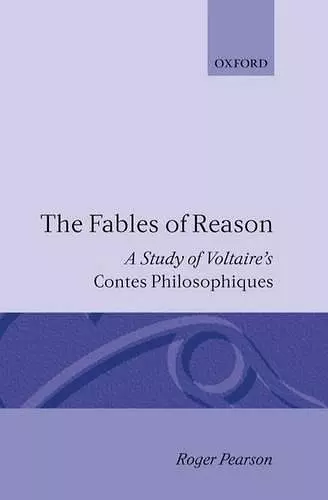The Fables of Reason
A Study of Voltaire's Contes Philosophiques
Format:Hardback
Publisher:Oxford University Press
Published:6th May '93
Currently unavailable, and unfortunately no date known when it will be back

Almost three hundred years after his birth in 1694, this is the first comprehensive study of Voltaire's contes philosophiques - the philosophical tales for which he is now best remembered and which include the masterpiece Candide. The Fables of Reason situates each of the twenty-six stories in its historical and intellectual context and offers new readings and approaches in the light of modern critical thinking. It rejects the traditional view that Voltaire's contes were the private expression of his philosophical perplexity, written merely in the margins of his historiography and his campaigns against the Establishment. Arguing that narrative is Voltaire's essential mode of thought, the book stresses the role of the reader and shows how the contes are designed less to communicate a set of truths than to encourage independence of mind. Roger Pearson has written a witty, lucid and scholarly guide to the `fables of reason' with which Voltaire undermined - and continues to undermine - the religious, philosophical, and economic `fables', by which other thinkers have tried to explain and direct human experience.
'... underlying the conceptual uncertainties in Pearson's arguments is a comprehensive, continuously interesting and attractively written analysis of Voltaire's art as a story-teller.' Edward James. Journal of European Studies. '94
'a very good book ... Pearson has surveyed what he calls the "fables of reason" in a solid, exegetical style and has provided, at the end of his essay, a provocative discussion of the two radical interpretations conferred on Voltaire - as the apostle of Enlightenment (Paul Valéry) or the precursor of twentieth-century totalitarianism (Isaiah Berlin). What distinguishes Pearson's essay is his readiness to take on the big names in Voltaire studies and offer more nuanced views of Voltaire's purposes and attitudes. Among the many gold nuggets of information found in this book some of the most lustrous are found in the chapter on Candide, wonderfully instructive treatise.' Arnold Ages, University of Waterloo, Eighteenth-Century Fiction 7:1
The paucity of general studies on Voltair'e fiction makes this one extremely welcome. This excellent study will contribute much to the appreciation of the contes, and deserves to be widely read. * ?? (C J Betts Univ of Warwick) *
Here is, surprisingly enough, the very first study to examine all twenty-six Contes individually as well as collectively. This in itself makes it an important book. * B.J. 18th C Studies Vol 18,2 *
Roger Pearson's excellent general study of Voltaire's fiction fills another surprising gap. A great deal has been written about individual tales, groups of tales, and particular aspects (technique, style, influences, sources, ideas) of the contes as a whole, but the broad perspective has been lacking. Pearson's overview, managed with an enviable lightness of touch and sound critical sense, goes beyond the worthy mise au point and makes an absorbing case for seeing Voltaire not as a novelist but as a maker of fables. * David Coward, University of Leeds, MLR, 92.2, 1997 *
ISBN: 9780198158806
Dimensions: 222mm x 143mm x 31mm
Weight: 485g
280 pages